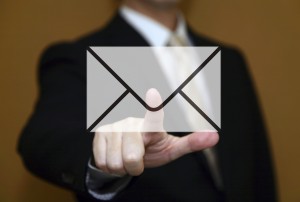Why am I receiving e-mails from myself?
A common complaint from people is that they receive dubious looking e-mails from seemingly themselves; how can this be possible, and why is it happening?
The quick answer is that the sender of an e-mail can call themselves whatever they want to, and the name in your inbox does not necessarily correspond with the actual e-mail address from which it is sent.

Have YOU ever received an an e-mail from yourself? (Image via Fotolia)
For example, my e-mail address is ian@diamond-discovery.com. Only I can send e-mails from this address. However, when people I e-mail receive e-mails from myself, the name that appears in their inbox is ‘Ian Vickers’. Why is this? This is because you can edit the covering name of your e-mail address to whatever you want it to be and it does not have to be at all related to the underlying e-mail address.
In other words, I could quite easily call myself ‘Joe Bloggs’ and send an e-mail from ian@diamond-discovery.com without any issues. The words ‘Ian’, ‘Vickers’ or ‘Diamond Discovery’ do not have to appear in the covering name associated with an e-mail.
Why is this? Simply put, companies that manage people’s e-mails realise that people’s name and titles change as they go through life, whether it via marriage or professional qualification, and that they require the ability for their name to appear as they choose. In addition, many people who have common names often have to end up with e-mail addresses that can be quite different to their actual names. Also there may be a need to differentiate between two employees with the same name who happen to work within the same organisation.
Given all of this, why are you receiving e-mails from yourself that you seemingly never sent? The answer is simple; spammers have appropriated your name or your e-mail address title (not your actual e-mail address) and have used it to cover the e-mail address from which they actually sending from. It is a rouse, and there is nothing technically you can do to stop people doing this.
A good analogy is postal mail. You can write whatever return address on the back on an envelope; it doesn’t necessarily mean that you wrote that particular letter at that address or that you sent the letter from that address. It also doesn’t necessarily mean you live or use that address either.
So what can you do? First of all, ask yourself the obvious question “Did you send this e-mail?” Chances are you probably did not. If you want reassurance that your e-mail address has not been hacked, the best way you can check is to look in your ‘Sent’ e-mail folder. Does the e-mail you have received from yourself appear at the date and time it appears to have been sent to your inbox? If not, your e-mail has not been hacked.
The second thing to note is that you should not open the e-mail. The reason the spammer has appropriated your name is so that you will open the message out of curiosity. Either the message will be a money making scam or something more malicious, such as a message containing ‘malware’ (software that can infect your computer). There is no need to open it and if you really have to, there are safer ways of doing so.
Thirdly, select the e-mail without opening it and block the sender. If you hover your mouse cursor over the e-mail name of the sender, you should see the underlying address from which the e-mail is sent – invariably this does not correspond with the e-mail address ‘on the surface’. You will then be blocking this underlying e-mail address and not yourself, and you will no longer get messages from this particular spammer.
Unfortunately, this appears to be a common tactic amongst spammers so chances are you will receive mysterious e-mails from yourself again in the future but from other senders. The best way to deal with this is to repeat the three steps outlined above again and when necessary.
The key thing to do is not panic; this is a common scam and it does not necessarily mean that your e-mail address has been hacked or that your details are particularly vulnerable. However, if having gone through the process above, and if you are still convinced something more malign is going on, get in touch with your e-mail provider who can double-check this on your behalf.
To find out more about e-mail hosting and Diamond Discovery’s e-mail hosting services, call 01656 725800 or e-mail info@preludeaccounts.com today.